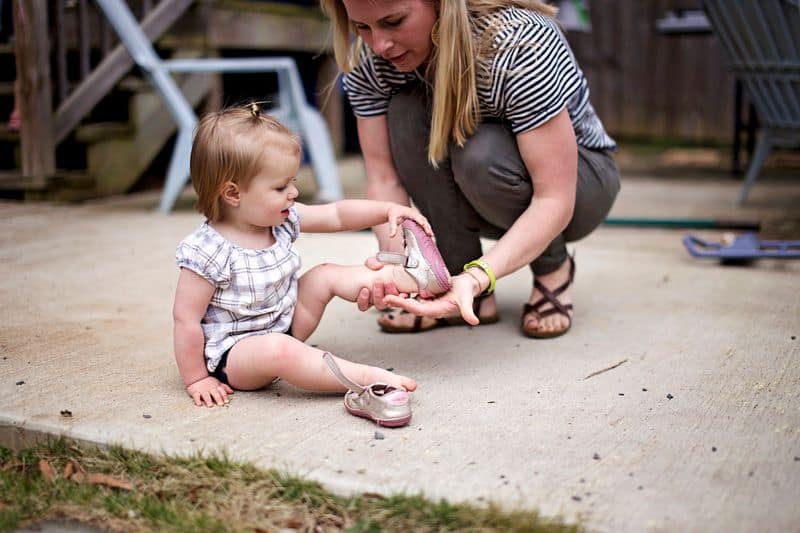Parenting is a journey filled with joyous milestones, but it also comes with its fair share of doubts and uncertainties. Every parent has moments when they question their decisions, wondering if they are on the right path. It’s natural to feel overwhelmed and unsure, especially when faced with the challenges of raising a child.
This blog post explores 12 common scenarios where parents often find themselves questioning their choices. Understanding that these moments are a normal part of parenting can provide comfort. Here, we discuss not only the situations that might cause doubt but also the affirmations and reminders that can guide you through these times.
1. The First Day of School Jitters

The first day of school is a significant milestone, often filled with anxiety for both the child and the parent. As you watch your little one walk into the classroom, it’s normal to second-guess if they’re ready. Remember, this is a big step in their growth. Supporting their independence while being available for reassurance is key. Talk to other parents; you are not alone in these feelings. Every child adjusts at their own pace, and your loving encouragement makes all the difference. Celebrate this new journey and trust in their ability to adapt and thrive.
2. Handling Public Tantrums

Public tantrums can be one of the most challenging and embarrassing moments. In the chaos, it’s easy to wonder if you’re handling it right. Remember, tantrums are a natural part of child development. Stay calm and composed. Offer comfort and set boundaries. It’s okay to leave the scene if needed. Reflect on triggers and plan for future outings. Patience and consistency are your allies. Know that other parents have been there too, and it’s not a reflection of your parenting skills. These moments will pass, leaving room for growth and understanding.
3. Balancing Work and Family Time

Balancing work and family life can be incredibly challenging. The guilt of not spending enough time with your child can be overwhelming. It’s important to remember that quality time matters more than quantity. Be present in the moments you do share, creating lasting memories. Prioritize family rituals or special activities that are meaningful. Communicate openly with your child about your work commitments. This transparency helps them understand and appreciate your efforts. Set boundaries to ensure work doesn’t encroach on family time. Finding the right balance is a continuous process, but being aware and intentional makes a difference.
4. Dealing with Sibling Rivalry

Sibling rivalry can cause parents to question their ability to maintain harmony. It’s crucial to remember that conflict is a normal part of sibling relationships, teaching valuable lessons in negotiation and empathy. Encourage your children to express their feelings and listen to each other. Set clear rules and intervene only when necessary. Praise cooperative behavior and emphasize teamwork. Use these moments to teach conflict resolution skills. Your role is to guide and support, not eliminate all disagreements. Understand that through these experiences, siblings form bonds and learn respect for one another, enriching their relationship.
5. Setting Boundaries and Limits

Setting boundaries is essential but often brings internal conflict. You might doubt if you’re too strict or too lenient. Remember, boundaries provide security and structure for children of all ages. Communicate clearly and consistently. Involve your children in discussions about rules to foster mutual respect. It’s okay to adjust limits as your child grows and changes. Consistency is crucial, but flexibility shows understanding. Your guidance helps them navigate life’s complexities. Take comfort in knowing that boundaries are a form of love, helping children feel safe and valued. Trust your instincts and adjust as needed.
6. Facing Peer Pressure

Peer pressure is a hurdle every parent faces, prompting fears about your child’s choices. It’s vital to equip them with confidence and decision-making skills. Have open conversations about values and consequences. Encourage self-expression and individuality. Remind them of the importance of true friendships. As a parent, being approachable and non-judgmental strengthens your child’s trust in you. Reinforce positive behavior and celebrate their courage to stand firm. Understand that facing peer pressure is part of growing up. Your support builds their resilience and ability to navigate challenging social situations with integrity.
7. Managing Digital Exposure

In today’s digital age, managing your child’s screen time and online presence is daunting. You may worry about their exposure to inappropriate content. Establish clear guidelines for technology use. Encourage balance by promoting offline activities. Discuss online safety and the permanence of digital footprints. Regular check-ins and open dialogues about their online experiences are crucial. Empower them to make responsible decisions. Trust is built through understanding and respect. Remember, teaching healthy digital habits is an ongoing process. Your involvement helps your child navigate the digital world safely, ensuring they benefit from technology responsibly.
8. Coping with Academic Pressure

Academic pressure can lead to self-doubt about supporting your child’s education. It’s important to foster a balanced approach. Encourage a love for learning rather than just grades. Recognize and celebrate effort, not just outcomes. Provide support without hovering, allowing them to own their learning journey. Openly discuss stress management and time organization. Ensure they have downtime to recharge. Reassure them of your unconditional support, regardless of academic performance. Your role is to guide and encourage, not to pressure. Trust in their capabilities and provide a nurturing environment for their growth and success.
9. Navigating Teenage Rebellion

Teenage rebellion can make you second-guess your parenting approach. It’s a phase where teens seek independence and identity. Maintain open communication and empathy. Set clear expectations while respecting their need for autonomy. Listen more than you talk, showing understanding of their feelings. This is a time to reinforce trust and patience. Avoid taking rebellion personally; it’s part of their growth. Offer guidance without imposing. Building a relationship based on mutual respect and trust will help navigate this turbulent phase. Your support and patience make a profound impact during these formative years.
10. Encouraging Emotional Expression

Encouraging emotional expression in children can be challenging. You might wonder if you’re nurturing or indulging. Understand that emotions are natural and healthy. Create a safe space for them to express feelings without judgment. Teach them to name and understand emotions. Encourage problem-solving and resilience. Lead by example; share your feelings openly. Acknowledging their emotions validates their experiences. Your patience and empathy foster emotional intelligence. These skills are vital for their social and personal development. Trust that by supporting their emotional expression, you’re equipping them with tools for healthy relationships and self-awareness.
11. Supporting Independence

Supporting your child’s independence is rewarding yet challenging. You may doubt if you’re letting go too soon. It’s crucial to balance guidance with freedom. Allow them to try new tasks and make decisions. Be there to support, not control. Celebrate their achievements, no matter how small. Encourage problem-solving and responsibility. This fosters confidence and self-reliance. Your faith in their abilities empowers them to tackle challenges. Remember, independence is a gradual process, and your support is their safety net. Trust in their growing capabilities, knowing that these experiences are building blocks for their future.
12. Confronting Health Challenges

Facing health challenges with your child can be one of the most testing times. The uncertainty can leave you questioning every decision. It’s important to stay informed and involved in their care. Maintain a positive outlook, providing reassurance and love. Ask questions and advocate for your child’s needs. Connect with support groups to share experiences. Remember, you are not alone in this journey. Your dedication and resilience are vital. Trust in the medical professionals and your instincts. Through your support, your child gains strength and comfort. These moments, though difficult, can strengthen the bond and trust between you.

Well, hello there!
My name is Jennifer. Besides being an orthodontist, I am a mother to 3 playful boys. In this motherhood journey, I can say I will never know everything. That’s why I always strive to read a lot, and that’s why I started writing about all the smithereens I came across so that you can have everything in one place! Enjoy and stay positive; you’ve got this!

